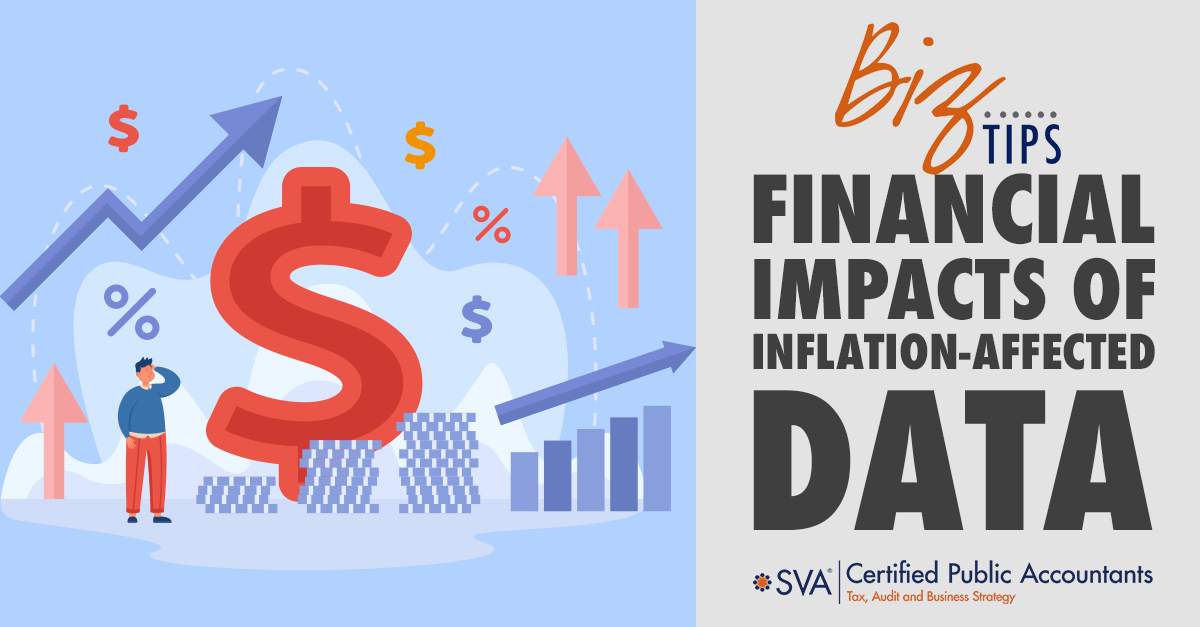| Highlights: |
- Warns that inflation and supply-chain pressures can distort financial results, making revenue growth appear stronger than actual volumes sold.
- Advises careful review of revenue, costs, and inventory levels to ensure price increases truly cover rising overhead and protect net income.
- Encourages proactive planning—adjusting prices, forecasting labor/service costs, and analyzing deeper financial drivers—to maintain sound financial decision-making.
|
Take a Critical Look at Your Financials.
Your Revenue Numbers Might Not Be What They Seem.
Looking at your financial goals for the balance of 2022 and 2023 comes with an extra challenge courtesy of inflation and supply chain challenges.
The inflation rate is expected to settle at about 9%, possibly higher for 2022 and another 3% to 4% for 2023. The causes of this are many, but we expect inflation to be something businesses need to address for the balance of 2022 and continue into 2023.
These significant challenges require you to evaluate your perspective on how you look at your financial data.
Review Your Increase in Revenue with Caution
Your revenue may have increased, but the quantities or volumes may not have. Whether it is the number of customers or products, the amount may have been less, but your revenue looks solid because of price increases due to inflation.
(Download Video Transcript)
Review Your Change in Expenses
Expense changes should be reviewed often, as the supply and demand challenges are causing increases that you may not be able to plan for. Be mindful of cost changes when pricing products and services. You may need to increase prices to cover shifts in costs, but that price increase does not necessarily translate to higher net income unless you prepare for a price increase over and above your cost increases.
We are seeing price increases not being enough to surpass and exceed the actual cost increases businesses are experiencing. The variables behind the cost increases continue to add up.
Historical Data Challenges
Using historical data to plan revenue increases is the typical approach. However, that data now needs to be looked at more in-depth. You may have a 5% increase in revenue, but the expenses have increased by 6%. Thus, your revenue growth is not what it appears at first glance.
Use caution when focusing on this financial data. Think about the inflation impact before you react to what your numbers are telling you.
Recession Implications on Inventory Levels
A recession could create a deflationary period at some level when prices are lowered. During a recession, demand reduces and potentially drives costs down. As a result, businesses carrying excess inventory could be exposing themselves to some additional financial pain.
The excess inventory acquired at a higher cost may need to be liquidated due to lack of consumer interest. Monitor inventory levels and sales trends closely. Be cautious about building excess inventory at higher costs.
(Download Video Transcript)
What Should You Do With This Information? Plan!
Fuel costs, access to shipments, and supply chain challenges are expected to continue this year. Price increases for your services and products will be necessary. Be prepared to increase prices to cover your increases in costs.
Continued increases for labor/services (employees and consultants) should be considered. The labor shortages and the fact consumers are paying more will continue to drive wage increases, which need to be reflected in your cost models.
Review your revenue goals and look deeper into the numbers to understand what drives your actual net-revenue increases. Ensure price increases are sufficient to cover cost increases, including overhead.
© 2022 SVA Certified Public Accountants

